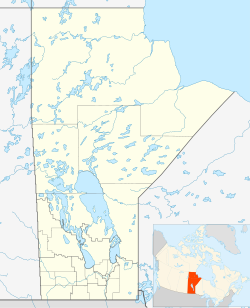
Summary
RCAF Station Brandon was a Second World War British Commonwealth Air Training Plan (BCATP) station located near Brandon, Manitoba, Canada. It was operated and administered by the Royal Canadian Air Force (RCAF).
| RCAF Station Brandon | |||||||||||||||||
|---|---|---|---|---|---|---|---|---|---|---|---|---|---|---|---|---|---|
| Near Brandon, Manitoba in Canada | |||||||||||||||||
 RCAF Station Brandon | |||||||||||||||||
| Coordinates | 49°55′N 099°57′W / 49.917°N 99.950°W[1] | ||||||||||||||||
| Site history | |||||||||||||||||
| In use | 1942-44 | ||||||||||||||||
| Airfield information | |||||||||||||||||
| Elevation | 1,322 ft (403 m) AMSL | ||||||||||||||||
| |||||||||||||||||
| Airfields | |||||||||||||||||
History edit
World War II edit
The facility was originally built by the Department of National Defense in 1941, for use as a Royal Canadian Air Force flight training school under the British Commonwealth Air Training Plan. On 16 May 1941, No. 12 Service Flying Training School was established at RCAF Station Brandon. The school trained pilots on more advanced multi-engined aircraft including the Cessna Crane and Avro Anson. On 30 March 1945, the school was closed in conjunction with the end of the Second World War. .[2]
Portions of the former RCAF station are now classified as a National Historic Site of Canada. The Commonwealth Air Training Plan Museum is a popular tourist attraction located at the former station that commemorates the BCATP and the former station.[3]
Aerodrome information edit
In approximately 1942 the aerodrome was listed as RCAF Aerodrome - Brandon, Manitoba at 49°55′N 99°57′W / 49.917°N 99.950°W with a variation of 13 degrees east and elevation of 1,322 ft (403 m). Six runways were listed as follows: [1]
| Runway Name | Length | Width | Surface |
|---|---|---|---|
| 8/26 | 2,700 ft (820 m) | 100 ft (30 m) | Hard surfaced |
| 8/26 | 2,700 ft (820 m) | 100 ft (30 m) | Hard surfaced |
| 2/20 | 2,720 ft (830 m) | 100 ft (30 m) | Hard surfaced |
| 2/20 | 2,720 ft (830 m) | 100 ft (30 m) | Hard surfaced |
| 14/32 | 2,700 ft (820 m) | 100 ft (30 m) | Hard surfaced |
| 14/32 | 2,700 ft (820 m) | 100 ft (30 m) | Hard surfaced |
Relief landing field – Chater edit
A relief landing field for RCAF Station Brandon was located approximately 6 mi (9.7 km) east. The site was located 5 miles northeast of the town of Chater, Manitoba. The relief field was constructed in the typical triangular pattern. In approximately 1942 the aerodrome was listed as RCAF Aerodrome - Chater, Manitoba at 49°55′N 99°48′W / 49.917°N 99.800°W with a variation of 13 degrees east and elevation of 1,333 ft (406 m). Three runways were listed as follows: [4]
| Runway Name | Length | Width | Surface |
|---|---|---|---|
| 8/26 | 2,700 ft (820 m) | 150 ft (46 m) | Hard surfaced |
| 2/20 | 2,700 ft (820 m) | 150 ft (46 m) | Hard surfaced |
| 14/32 | 2,700 ft (820 m) | 150 ft (46 m) | Hard surfaced |
At some point after the war the former relief field was sold and decommissioned as an aerodrome. The aerodrome has been declared abandoned.[5] A review of Google Maps on 7 June 2018 shows a very visible airfield at the listed coordinates. But runway orientation is flipped top to bottom with the drawing in the book from c.1942.
Relief landing field – Douglas edit
The second relief landing field for RCAF Station Brandon was located approximately 14 mi (23 km) east. The site was located north east of the town of Douglas, Manitoba. In approximately 1942 the aerodrome was listed as RCAF Aerodrome - Douglas, Manitoba at 49°55′N 99°39′W / 49.917°N 99.650°W with a variation of 12.5 degrees east and elevation of 1,262 ft (385 m). The Relief field was listed as Turf all way, however no dimensional data was provided.[6] A review of Google Maps on 7 June 2018 shows no visibility of an airfield near the posted coordinates.
Present day edit
The airport is now operating as the Brandon Municipal Airport
References edit
- ^ a b Staff writer (c. 1942). Pilots Handbook of Aerodromes and Seaplane Bases Vol. 2. Royal Canadian Air Force. p. 1.
- ^ Hatch, F. J. (1983). The Aerodrome of Democracy: Canada and the British Commonwealth Air Training Plan, 1939-1945. Ottawa: Directorate of History, Department of National Defence. ISBN 0660114437.
- ^ Airport History Retrieved 11 June 2018
- ^ Staff writer (c. 1942). Pilots Handbook of Aerodromes and Seaplane Bases Vol. 2. Royal Canadian Air Force. p. 3.
- ^ Anon (2001). "Abandoned Aerodromes". Canada Flight Supplement Effective 0901Z 17 May 2001 To 0901Z 12 Jul 2001. Ottawa: Geomatics Canada, Department of Natural Resources. p. A28.
- ^ Staff writer (c. 1942). Pilots Handbook of Aerodromes and Seaplane Bases Vol. 2. Royal Canadian Air Force. p. 6.


